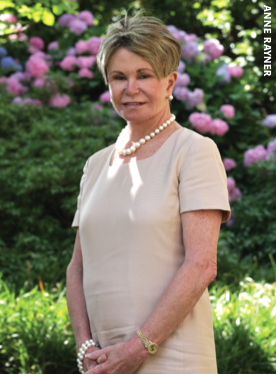Colleen Conway-Welch
 Colleen Conway-Welch, MSN, Ph.D.
Colleen Conway-Welch, MSN, Ph.D.
Dean, School of Nursing
What are the major changes you think will come to Vanderbilt and the Medical Center over the next 10 years?
I foresee nurses involved in every aspect of Vanderbilt’s future. I think the Medical Center will continue to grow the Advanced Practice Nurse (APN) workforce and further identify how these highly qualified practitioners improve the quality and efficiency of how we deliver care. I believe the next big site for health care delivery is outside the hospital and clinic setting and inside the home. We will embrace technology in such a way to link practitioners, patients and families together for more collaborative care. Right now, our national health care delivery system incentivizes illness versus wellness. We have a real opportunity in the coming years to make huge strides in quality and along the way, incentivize people to get and stay well. I would also like to see Vanderbilt making a profound difference in wellness for individuals in remote parts of the world as well as in our community.
Where do you see the seeds of those changes now?
Vanderbilt is doing a tremendous job laying the groundwork for the future. We have some of the nation’s best and brightest minds leveraged against this work. The School of Medicine’s Bonnie Miller and School of Nursing’s Senior Associate Dean of Academics, Linda Norman, are making wonderful strides in inter-professional education that is the bedrock of all things to come. Bill Stead and our own Senior Associate Dean of Informatics, Betsey Weiner, are leading technological innovators asking the tough questions and trying to find solutions. Thanks to Bonnie Pilon, Senior Associate Dean of Clinical Practice and Community Partnerships, we have a robust practice network for our students and are delivering high-quality health care in a number of under served areas throughout Nashville. What nurse researchers like Ann Minnick, Senior Associate Dean of Research, do best is creating a culture where nurses can do translational work—looking at the care of specific populations. All of these initiatives will have an impact on Vanderbilt and health care in general.
What is happening now at Vanderbilt that has a chance to have impact all over the world?
Two words: “personalized medicine.” I think we will look back on this window of time at Vanderbilt, a time when we focused on ways to accurately access a patient’s DNA for various treatments, and see it as a pivotal point for the way health care is delivered now and in the future. The implications will be profound, far-reaching and change our definition of health care as we currently know it.
What are the biggest obstacles or challenges Vanderbilt and the Medical Center will face in the next 10 years?
Vanderbilt is doing a lot of things the right way, and one of those is our commitment to quality and safety in health care delivery. There is a lot of pressure for health systems to improve their quality measurements, like infection rates. We constantly work on quality measures, but the reimbursement rates from the federal government do not reward us to do so—at least at this point in time. I see this trend changing in the future. I believe Vanderbilt, like other academic medical centers, will continue to face challenges as they relate to the financial aspects of current reimbursement structures for clinical services as well as support for education.
What are your hopes for Vanderbilt and the Medial Center in the next 10 years?
I want to see the Medical, Graduate and Nursing schools all ranked No. 1 in the country in national rankings! I think we will see more work in the area of population health, particularly underserved populations. We need to be vigilant in our efforts to make sure Vanderbilt has a profound and meaningful effect on Nashville by improving all the census track metrics of our local community. I want to see the traditional silos, common at any institution of higher learning, replaced with open and collaborative ways to teach our students—not just medical and nursing students—but involving all the schools at Vanderbilt. This type of academic experience brings to bear the expertise of the faculty resources we have in all the schools at Vanderbilt creating a rich interdisciplinary education experience for students.
What do you think Vanderbilt nursing education will look like in 10 years?
I think private schools like Vanderbilt have a responsibility and opportunity to re-think how education is delivered. Much of higher education is based on tradition, rather than practicality. Nowhere is it written that one has to complete “x” years of school to earn a specific nursing degree, medical degree, etc. We need to make programs more competency based. We need to shorten or distill the curriculums to make them as time- and cost-efficient as possible, while maintaining or increasing the quality of our educational offerings. I would also like to see a wide variety of students, representing all the schools at Vanderbilt, taking courses together.
What role do you think advanced practice and doctorally prepared nurses will be playing in health care delivery in 10 years?
They will own primary care because our nation’s physicians will be needed to handle the most complex cases and sickest patients. APNs, PhDs and DNPs (Doctor of Nursing Practice) will be hospitalists and playing major roles in academic health. They will be designing home health care delivery and leading teams of other nurses and health care workers.
Leave a Response